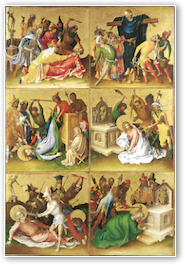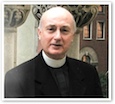The Indwelling of Christ
- FATHER GEORGE W. RUTLER
Bishop Hippolytus of Caesarea wrote down the oral traditions of the lives of the Twelve Apostles.
 "Duc in altum." Cast into the deep — or, take the plunge. Christ said it to his disciples (Luke 5:4). When they did as they were told, they caught an astonishing number of fish, and then they left everything and followed him (Luke 5:11). When Bishop Hippolytus of Caesarea wrote down the oral traditions of the lives of the Twelve, he was about as close to the Resurrection as we are to the birth of Antonio Salieri and the death of Johann Sebastian Bach, whose music still lives with us.
"Duc in altum." Cast into the deep — or, take the plunge. Christ said it to his disciples (Luke 5:4). When they did as they were told, they caught an astonishing number of fish, and then they left everything and followed him (Luke 5:11). When Bishop Hippolytus of Caesarea wrote down the oral traditions of the lives of the Twelve, he was about as close to the Resurrection as we are to the birth of Antonio Salieri and the death of Johann Sebastian Bach, whose music still lives with us.
Andrew preached in Bulgaria and was crucified on an olive tree in Greece. Bartholomew preached in India and was crucified with his head downward in the part of Armenia that now is in the former Soviet state of Georgia. James, son of Alphaeus was stoned to death in Jerusalem, and James, son of Zebedee, was beheaded by the tetrarch Herod. His brother John, the only apostle known to have not died violently, was exiled to the island of Patmos by the emperor Domitian, later going to Turkey and dying in Ephesus during the reign of Trajan. Matthew died in Hieres near present-day Tehran.
Peter shared his remembrances with Mark and was crucified in Rome. After preaching in Pontus, Galatia, Cappadocia, Betania, Italy and Asia, Philip was crucified with his head downward in Hierapolis in eastern Turkey during the reign of Domitian. Simon the Zealot was the second bishop of Jerusalem, but is said to have also preached in Egypt and Persia where he was sawed to pieces. Thaddeus, who preached in Edessa and throughout Mesopotamia, was axed to death in Syria. Thomas preached throughout Persia and was speared to death at Calamene in India. Only Judas killed himself, never having left Jerusalem.
The point is that these men did not live superficial lives. They took the plunge and fulfilled the promise of the Master that they would become fishers of men. They did not leave their homes and families and their businesses just to follow a theory, for, as Newman said, "No man will be a martyr for a conclusion." They willingly died in the glory of the Resurrection, which they had seen.
Socrates, having said that the unexamined life is not worth living, changed the lives of many, who passed on what they had learned. None of his disciples, however, and no disciple of any other teacher, could say with Saint Paul, who was chosen after the Master had risen from the dead: "It is no longer I who live but Christ who lives in me" (Galatians 2:20). Plato never said that Socrates lived in him; but if Socrates had lived long enough to take the plunge with the untutored fishermen, he might have found a good Greek term for the indwelling of Christ, the sanctifying grace, that moves men to leave everything and die telling others what happened to them.
 This is Meaghen Gonzalez, Editor of CERC. I hope you appreciated this piece. We curate these articles especially for believers like you.
This is Meaghen Gonzalez, Editor of CERC. I hope you appreciated this piece. We curate these articles especially for believers like you.
Please show your appreciation by making a $3 donation. CERC is entirely reader supported.

Acknowledgement
 Father George W. Rutler. "The Indwelling of Christ." From the Pastor (February 14, 2016).
Father George W. Rutler. "The Indwelling of Christ." From the Pastor (February 14, 2016).
Reprinted with permission of Father George W. Rutler.
The Author
 Father George W. Rutler is the pastor of St. Michael's church in New York City. He has written many books, including: The Wit and Wisdom of Father George Rutler, The Stories of Hymns, Hints of Heaven: The Parables of Christ and What They Mean for You, Principalities and Powers: Spiritual Combat 1942-1943, Cloud of Witnesses — Dead People I Knew When They Were Alive, Coincidentally: Unserious Reflections on Trivial Connections, A Crisis of Saints: Essays on People and Principles, Brightest and Best, and Adam Danced: The Cross and the Seven Deadly Sins.
Father George W. Rutler is the pastor of St. Michael's church in New York City. He has written many books, including: The Wit and Wisdom of Father George Rutler, The Stories of Hymns, Hints of Heaven: The Parables of Christ and What They Mean for You, Principalities and Powers: Spiritual Combat 1942-1943, Cloud of Witnesses — Dead People I Knew When They Were Alive, Coincidentally: Unserious Reflections on Trivial Connections, A Crisis of Saints: Essays on People and Principles, Brightest and Best, and Adam Danced: The Cross and the Seven Deadly Sins.


